旅游学概论试卷附答案
旅游概论期末考试题(附含答案)
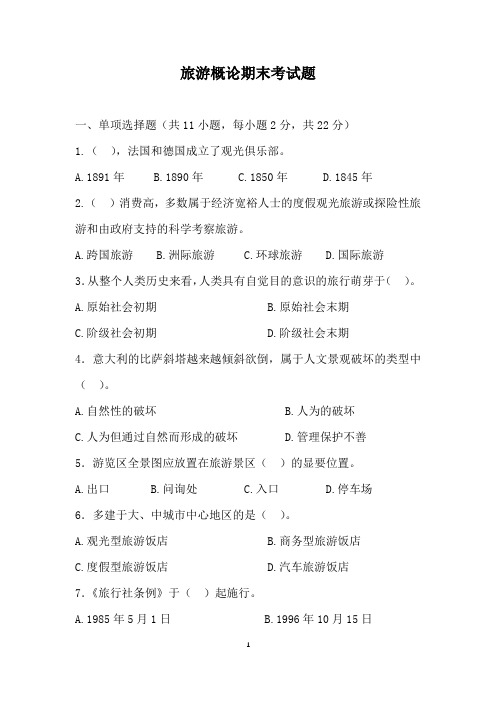
旅游概论期末考试题一、单项选择题(共11小题,每小题2分,共22分)1.(),法国和德国成立了观光俱乐部。
A.1891年B.1890年C.1850年D.1845年2.()消费高,多数属于经济宽裕人士的度假观光旅游或探险性旅游和由政府支持的科学考察旅游。
A.跨国旅游B.洲际旅游C.环球旅游D.国际旅游3.从整个人类历史来看,人类具有自觉目的意识的旅行萌芽于()。
A.原始社会初期B.原始社会末期C.阶级社会初期D.阶级社会末期4.意大利的比萨斜塔越来越倾斜欲倒,属于人文景观破坏的类型中()。
A.自然性的破坏B.人为的破坏C.人为但通过自然而形成的破坏D.管理保护不善5.游览区全景图应放置在旅游景区()的显要位置。
A.出口B.问询处C.入口D.停车场6.多建于大、中城市中心地区的是()。
A.观光型旅游饭店B.商务型旅游饭店C.度假型旅游饭店D.汽车旅游饭店7.《旅行社条例》于()起施行。
A.1985年5月1日B.1996年10月15日C.1997年5月1日D.2017年5月1日8.我国旅游业应把工作重点逐步转向()。
A.国内旅游B.国际旅游C.入境旅游D.出境旅游9.不属于假日旅游存在和发展的主要原因的是()。
A.消费观念的转变B.趋向常态化C.交通条件的改善D.收入水平的提高10.在世界旅游市场中,无论旅游人次的多少还是旅游收入的高低,都主要取决于()。
A.旅游距离的远近B.交通工具的优劣C.旅游资源的多少D.经济基础是否雄厚11.不属于旅游强国的是()。
A.朝鲜B.美国C.德国D.奥地利二、多项选择题(共5小题,每小题3分,共15分)1.“精神上的愉快感受”包含()。
A.人身的自由感B.精神上的解放感C.旅游过程的幸福感D.特定需要的满足感2.属于国际会议旅游主要接待国的有()。
A.美国B.瑞士C.奥地利D.意大利3.关于游客的大众性的叙述,正确的有()。
A.旅游者阶层的广泛性B.普通民众积极参与,成为现代旅游的主力军C.规模性D.旅游从贵族化向平民化发展4.属于饭店服务产品的基本特点的有()。
旅游学概论》期末试卷及答案
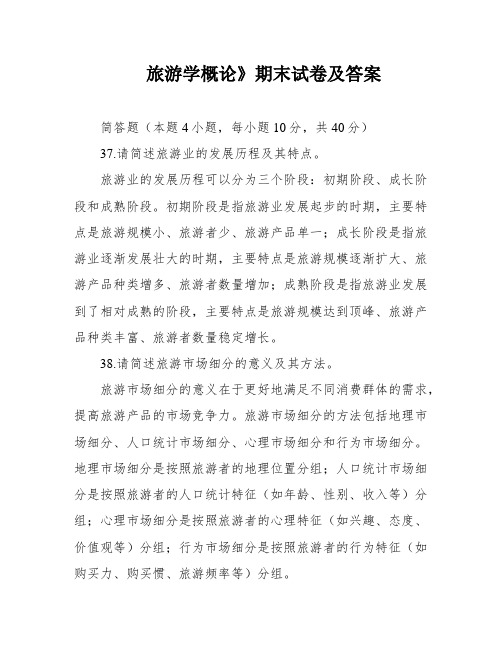
旅游学概论》期末试卷及答案简答题(本题4小题,每小题10分,共40分)37.请简述旅游业的发展历程及其特点。
旅游业的发展历程可以分为三个阶段:初期阶段、成长阶段和成熟阶段。
初期阶段是指旅游业发展起步的时期,主要特点是旅游规模小、旅游者少、旅游产品单一;成长阶段是指旅游业逐渐发展壮大的时期,主要特点是旅游规模逐渐扩大、旅游产品种类增多、旅游者数量增加;成熟阶段是指旅游业发展到了相对成熟的阶段,主要特点是旅游规模达到顶峰、旅游产品种类丰富、旅游者数量稳定增长。
38.请简述旅游市场细分的意义及其方法。
旅游市场细分的意义在于更好地满足不同消费群体的需求,提高旅游产品的市场竞争力。
旅游市场细分的方法包括地理市场细分、人口统计市场细分、心理市场细分和行为市场细分。
地理市场细分是按照旅游者的地理位置分组;人口统计市场细分是按照旅游者的人口统计特征(如年龄、性别、收入等)分组;心理市场细分是按照旅游者的心理特征(如兴趣、态度、价值观等)分组;行为市场细分是按照旅游者的行为特征(如购买力、购买惯、旅游频率等)分组。
39.请简述旅游资源的分类及其特点。
旅游资源可以分为自然资源、文化资源和人文资源。
自然资源是指大自然所赋予的旅游资源,如山水、气候、动植物等,其特点是独特性、稀缺性和不可再生性;文化资源是指人类创造的旅游资源,如历史遗迹、文化景观、民俗风情等,其特点是历史性、文化性和地域性;人文资源是指人类活动所创造的旅游资源,如城市建筑、艺术作品、体育赛事等,其特点是现代性、多样性和时尚性。
40.请简述旅游交通的类型及其特点。
旅游交通可以分为陆路交通、水路交通和空中交通。
陆路交通是指旅游者在旅游过程中使用的陆地交通工具,如汽车、火车、自行车等,其特点是灵活性、经济性和便捷性;水路交通是指旅游者在旅游过程中使用的水上交通工具,如游船、快艇、游轮等,其特点是舒适性、观赏性和浪漫性;空中交通是指旅游者在旅游过程中使用的航空交通工具,如飞机、直升机等,其特点是快捷性、安全性和舒适性。
旅游学概论试题及答案

旅游学概论试题及答案一、选择题(每题2分,共20分)1. 旅游学是一门研究什么的学科?A. 旅游管理B. 旅游经济C. 旅游活动D. 旅游文化2. 旅游活动的基本要素包括以下哪些?A. 旅游者、旅游资源、旅游服务B. 旅游者、旅游目的地、旅游交通C. 旅游者、旅游产品、旅游市场D. 旅游者、旅游设施、旅游服务3. 旅游者选择旅游目的地时,通常考虑的因素有哪些?A. 价格、距离、兴趣B. 安全、文化、环境C. 价格、文化、兴趣D. 安全、距离、环境4. 旅游规划的主要目的是什么?A. 提高旅游收入B. 促进地区经济发展C. 保护旅游资源和环境D. 增加旅游就业机会5. 旅游市场细分的依据是什么?A. 旅游者的收入水平B. 旅游者的消费习惯C. 旅游者的需求和偏好D. 旅游者的年龄和性别6. 旅游产品开发需要考虑哪些因素?A. 市场需求、资源条件、文化特色B. 价格定位、服务水平、宣传推广C. 旅游者偏好、竞争对手、政策环境D. 旅游季节、旅游时间、旅游成本7. 旅游服务质量管理的核心是什么?A. 服务标准化B. 服务个性化C. 服务效率化D. 服务人性化8. 旅游目的地形象的构建通常包括哪些方面?A. 地理环境、历史文化、社会风貌B. 旅游设施、旅游服务、旅游产品C. 旅游政策、旅游法规、旅游管理D. 旅游者评价、媒体宣传、口碑传播9. 旅游可持续发展的目标是什么?A. 经济利益最大化B. 社会文化保护C. 环境资源保护D. 旅游者数量增加10. 旅游危机管理的主要任务是什么?A. 预防和减少危机发生B. 快速响应和处理危机C. 恢复和重建旅游市场D. 所有上述选项答案:1-5 CADCA,6-10 ABBCD二、简答题(每题10分,共30分)1. 简述旅游学研究的主要内容。
答案:旅游学研究的主要内容主要包括旅游者行为研究、旅游资源的开发与利用、旅游产品的设计与管理、旅游市场的研究与开发、旅游服务的质量管理、旅游经济的影响与评估、旅游政策与法规的研究、旅游目的地的规划与管理、旅游可持续发展战略以及旅游危机管理等。
《旅游学概论》期末复习试题5套含答案(大学期末复习资料)
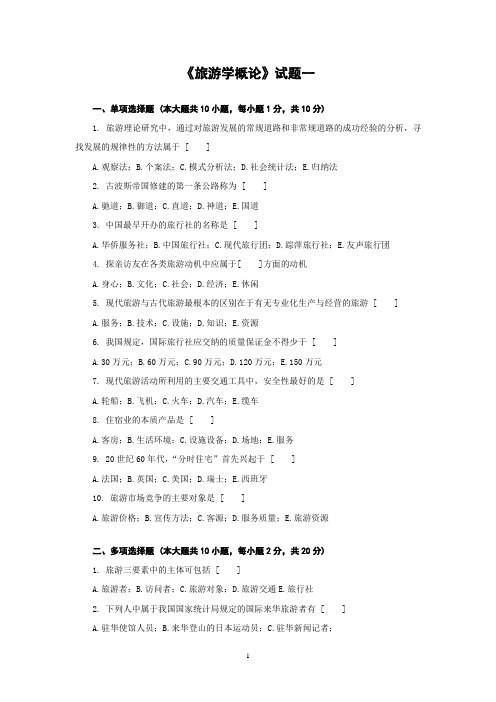
《旅游学概论》试题一一、单项选择题 (本大题共10小题,每小题1分,共10分)1. 旅游理论研究中,通过对旅游发展的常规道路和非常规道路的成功经验的分析,寻找发展的规律性的方法属于 [ ]A.观察法;B.个案法;C.模式分析法;D.社会统计法;E.归纳法2. 古波斯帝国修建的第一条公路称为 [ ]A.驰道;B.御道;C.直道;D.神道;E.国道3. 中国最早开办的旅行社的名称是 [ ]A.华侨服务社;B.中国旅行社;C.现代旅行团;D.踪萍旅行社;E.友声旅行团4. 探亲访友在各类旅游动机中应属于[ ]方面的动机A.身心;B.文化;C.社会;D.经济;E.休闲5. 现代旅游与古代旅游最根本的区别在于有无专业化生产与经营的旅游 [ ]A.服务;B.技术;C.设施;D.知识;E.资源6. 我国规定,国际旅行社应交纳的质量保证金不得少于 [ ]A.30万元;B.60万元;C.90万元;D.120万元;E.150万元7. 现代旅游活动所利用的主要交通工具中,安全性最好的是 [ ]A.轮船;B.飞机;C.火车;D.汽车;E.缆车8. 住宿业的本质产品是 [ ]A.客房;B.生活环境;C.设施设备;D.场地;E.服务9. 20世纪60年代,“分时住宅”首先兴起于 [ ]A.法国;B.英国;C.美国;D.瑞士;E.西班牙10. 旅游市场竞争的主要对象是 [ ]A.旅游价格;B.宣传方法;C.客源;D.服务质量;E.旅游资源二、多项选择题 (本大题共10小题,每小题2分,共20分)1. 旅游三要素中的主体可包括 [ ]A.旅游者;B.访问者;C.旅游对象;D.旅游交通E.旅行社2. 下列人中属于我国国家统计局规定的国际来华旅游者有 [ ]A.驻华使馆人员;B.来华登山的日本运动员;C.驻华新闻记者;D.参加广交会的外国商人;E.回大陆探亲的台湾同胞3. 属于余暇的时间包括 [ ]A.看电视时间;B.自学外语时间;C.上下班坐车时间;D.郊游时间E.家务劳动时间4. 旅游资源的变化性主要指 [ ]A.生态环境的变化;B.管理体制;C.资源体的自然损耗;D.旅游地的扩建;E.资源吸引力的变化5. 旅游区点的可进入性所包含的主要内容有 [ ]A.交通;B.管理体制;C.政策;D.社会安定程度;E.当地居民对旅游业的态度6. 人们习惯上的旅游服务质量评价标准所包括的四个方面是 [ ]A.服务态度;B.服务技能;C.服务项目;D.消费档次;E.价格低廉7. 在非主要交通工具中,缆车的主要优点有 [ ]A.运载能力大;B.减少环境污染;C.占地面积小;D.消费价格低廉;E.减少植被破坏8. 衡量一个国家或地区旅游接待能力强弱的主要因素包括 [ ]A.机场吞吐量;B.住宿业建设水平;C.旅游资源数量;D.服务质量;E.当地人的好客程度9. 住宿业建设在突出民族特色和地方风格方面需要注意解决的矛盾是 [ ]A.民族化与现代化;B.便利性和低价位;C.高档次和艺术性;D.简朴性和多样性;E.实用性与艺术性10. 国际旅游者首先选择近距离地区流动的主要原因是 [ ]A.比较经济花费较少;B.能当日往返;C.连续假日较短时也可出游;D.交通便利,易于掌握旅游时间;E.民族习惯和文化传统上比较接近三、填空题 (本大题共20个空,每空1分,共20分)1. 旅游是集_____________化交往模式和_____________化交往模式优点的积极而健康的交往。
旅游学概论自考试题及答案
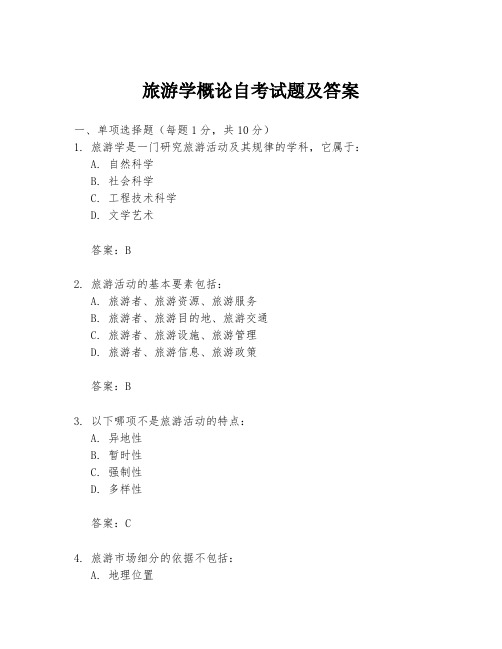
旅游学概论自考试题及答案一、单项选择题(每题1分,共10分)1. 旅游学是一门研究旅游活动及其规律的学科,它属于:A. 自然科学B. 社会科学C. 工程技术科学D. 文学艺术答案:B2. 旅游活动的基本要素包括:A. 旅游者、旅游资源、旅游服务B. 旅游者、旅游目的地、旅游交通C. 旅游者、旅游设施、旅游管理D. 旅游者、旅游信息、旅游政策答案:B3. 以下哪项不是旅游活动的特点:A. 异地性B. 暂时性C. 强制性D. 多样性答案:C4. 旅游市场细分的依据不包括:A. 地理位置B. 人口统计C. 心理特征D. 旅游目的答案:D5. 旅游规划的主要目的是什么?A. 提高旅游收入B. 保护旅游资源C. 促进地区经济发展D. 以上都是答案:D6. 旅游业的三大支柱包括:A. 交通、住宿、餐饮B. 旅行社、旅游交通、旅游景点C. 政府、企业、非政府组织D. 文化、体育、娱乐答案:B7. 旅游产品的核心部分是:A. 旅游服务B. 旅游体验C. 旅游信息D. 旅游设施答案:B8. 旅游需求的弹性通常较大,这是因为:A. 旅游价格变化敏感B. 旅游时间灵活C. 旅游目的地可替代性强D. 旅游者收入水平影响答案:C9. 旅游规划中的SWOT分析不包括:A. 优势(Strengths)B. 劣势(Weaknesses)C. 机会(Opportunities)D. 风险(Risks)答案:D10. 旅游可持续发展的核心是:A. 经济效益最大化B. 保护环境和文化C. 满足当代人需求D. 促进社会进步答案:B二、多项选择题(每题2分,共10分)11. 旅游规划需要考虑的因素包括:A. 旅游资源的保护与开发B. 旅游市场的需求分析C. 旅游目的地的交通状况D. 旅游政策的制定与执行答案:ABCD12. 旅游者选择旅游目的地时通常会考虑的因素有:A. 目的地的安全性B. 旅游价格C. 个人兴趣D. 旅游目的地的知名度答案:ABCD13. 旅游服务的特点包括:A. 不可分割性B. 不可储存性C. 质量的不确定性D. 服务的有形性答案:ABC14. 旅游目的地的竞争力取决于:A. 旅游资源的丰富度B. 旅游服务的质量C. 旅游价格的合理性D. 旅游目的地的形象答案:ABCD15. 旅游发展对环境可能产生的负面影响包括:A. 生态破坏B. 文化冲突C. 环境污染D. 资源过度开发答案:ABCD三、判断题(每题1分,共5分)16. 旅游学是一门综合性学科,涉及经济学、地理学、社会学等多个领域。
《旅游学概论》试题及答案

《旅游学概论》试题一、单项选择题(本大题共5小题,每小题2分,共12分)下列每小题列出的四个选项中只有一个选项是符合题目要求的,请将正确选项的序号填在题后的括号内。
1、我国古代酷爱登山且登山常穿木制钉鞋,人称“谢公屐”的著名诗人是()A.谢灵运B.谢眺C李白D.徐霞客2、1923年中国出现最早的旅游组织是上海商业储蓄银行旅行部(后改为中国旅行社),其创始人是()A.陈光甫B.黄炎培C.柳亚子D.章土钊3、世界旅游组织宣布每年的旅游日是()A.5月19日B.7月15日C.9月27日D.11月5日4、我国把《徐霞客游记》开篇日记的日期定为中国旅游日,这一日是()A.5月19日B.9月27日C.8月22日D.10月1日5、世界旅游组织的简称是( )A、UFTAAB、WTOC、IHAD、ICAO6、、新中国第一家旅行社于1949年11月19日在()成立的华侨服务社。
A 北京B 厦门C 武汉D 上海二、填空题(本大题共10小题,每空1分,共38分)1、古代中国的旅游形式多种多样,如、、、、、等。
2、1954年4月旅行社成立。
3、在西方古代旅游史上,曾出现过一大批著名的旅行家,其中有阿拉伯帝国的旅家、,意大利旅行家,葡萄牙航海家和。
4、20世纪初,享誉世界的三大旅行代理公司是指、、。
5、经营旅游业的三大要素是、、。
6、根据联合国《国际产业划分标准》和旅游业务的具体情况分析,旅游业主要由三大部分构成,即、、,这三大部分也是旅游业的三大支柱。
7、旅游客流简称为。
测定旅游客流的主要指标是旅游客流的和。
8、通常使用的市场营销策略有、、、。
9、国际旅游的发展模式一般有四种,分别是、、、和。
10、中国旅游发展是按照“五个一起上”的方针进行的,所谓“五个一起上”是指、、、、一起上。
三、名词解释(本大题共5小题,每小题4分,共20分)1、帝王巡游2、士人漫游3、旅游者4、旅游资源5、旅游市场四、简答题(本题共3小题,每小题5分,共15分)1、简答旅游业的特点。
旅游概论理论考试题(后附答案)

旅游概论理论考试题一、单项选择题(共11小题,每小题2分,共22分)1.()虽然在近几年发展最快,但仍属于传统的旅游形式之一。
A.观光旅游 B.专项旅游 C.会议旅游 D.商务旅游2.(),第十三届全国人民代表大会通过批准国家旅游局改为文化和旅游部。
A.1964年7月22日B.1982年8月23日C.2009年5月1日D.2018年3月17日3.北欧国家的带薪假期相对集中在()。
A.1~3月B.4~6月C.7~9月D.10~12月4.2001年发生在美国的“9·11”恐怖事件,使美国旅游业受到重创,而且波及世界,表明旅游业具有()。
A.综合性的特点B.带动性的特点C.涉外性的特点D.敏感性的特点5.截至2018年10月17日,文化和旅游部共确定了()国家5A 级旅游风景区。
A.258个B.248个C.228个D.218个6.生态旅游发展的原则不包括()。
A.多而精原则B.少而精原则C.保护原则D.“双赢”原则7.不属于国际旅游“黄金线路”的旅游资源是()。
A.非洲天然动物园B.埃及金字塔C.地中海之滨D.重庆欢乐谷8.娱乐类旅游娱乐设施具有的特点是()。
A.规则性B.享乐性C.艺术性D.思想性9.不属于世界旅游强国的是()。
A.德国B.新加坡C.泰国D.澳大利亚10.不属于以旅游娱乐业发达而闻名于世的城市是()。
A.拉斯维加斯B.巴黎C.好莱坞D.蒙地卡罗11.生态旅游活动的客体是()。
A.旅游者B.生态旅游资源C.旅游业D.旅游资源二、多项选择题(共5小题,每小题3分,共15分)1.属于专项旅游的有()。
A.乡村旅游B.会展旅游C.会议旅游D.宗教旅游2.属于世界文明古国的有()。
A.古埃及B.古希腊C.古罗马D.古印度3.不属于宋元时期旅游名篇的有()。
A.《桃花源记》B.《史记》C.《岳阳楼记》D.《赤壁赋》4.旅游景区的特点有()。
A.专用性B.可控性C.长久性D.变化性5.智慧旅游具备()三个主要特征。
旅游学概论试题及答案

旅游学概论试题及答案 TTA standardization office【TTA 5AB- TTAK 08- TTA 2C】《旅游学概论》试题一一、填空题(每空1分,共25分)1.“观光”一词最早来自中国古代名着_______上的“观国之光”。
年,英国人托马斯.库克利用包租火车的方式组织了一次从莱斯特前往洛赫伯勒的团体旅游,这标志着_______及_______的开端。
3.旅游承载力决定着可持续旅游发展的_______.4.根据旅游学对旅游活动类型的分类,按_______划分,可将旅游活动分为航空旅游、铁路旅游、汽车旅游和游船旅游等多种类型。
5.在旅游统计中,某一旅游景区的平均单位面积接待旅游者的人数,被称为“_______”。
6.决定个人旅游需求的二大客观因素是:足够的_______和足够的_______.7.美国旅游学家罗伯特.W.麦金托什提出,旅游动机可划分为四种基本类型,即:_______方面的动机、_______方面的动机、_______方面的动机、地位和声望方面的动机。
8.一个旅游点的生命周期可划分为:初创期、_______期、_______期、衰退期等四个阶段。
9.旅游者的旅游活动包括食、宿、游、_______、_______、_______等六要素。
10.旅游_______是一种使用价值,而且是一种特殊的使用价值。
11.考核一个饭店的等级时要从其“硬件”和“软件”、_______的数量和提供服务的质量等方面同时评定。
12.旅游服务产品的外部质量是指能够符合并满足_______.13.从50年代至今,_______地区一直是世界上最重要的国际旅游客源地和目的地。
14.企业将目标市场重点化的目的是集中有限的人力和物力,更有效地开展_______.15.旅游所带来的影响主要表现在对经济、社会和_______等方面的影响。
16.旅游业属于第_______产业。
17.根据当地的自然条件和社会经济条件制定相应_______,对于防止和控制旅游饱和或接待量超负荷是非常重要的。
旅游学概论试题及答案.docx
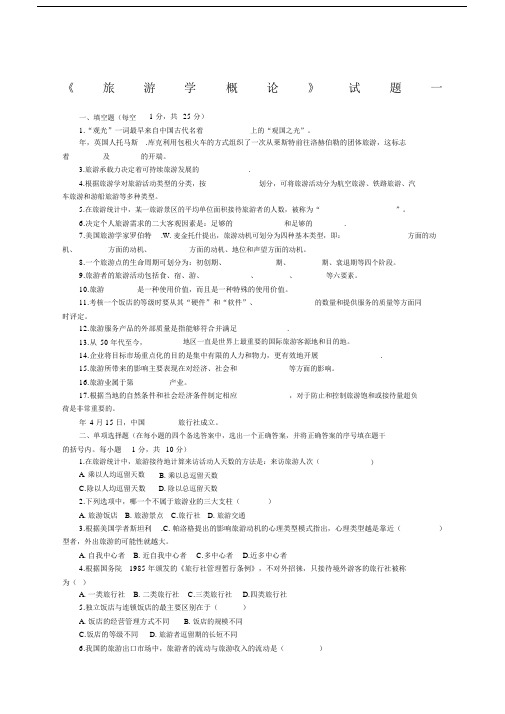
《旅游学概论》试题一一、填空题(每空 1 分,共25 分)1.“观光”一词最早来自中国古代名着_______ 上的“观国之光”。
年,英国人托马斯.库克利用包租火车的方式组织了一次从莱斯特前往洛赫伯勒的团体旅游,这标志着 _______ 及 _______的开端。
3.旅游承载力决定着可持续旅游发展的_______.4.根据旅游学对旅游活动类型的分类,按_______ 划分,可将旅游活动分为航空旅游、铁路旅游、汽车旅游和游船旅游等多种类型。
5.在旅游统计中,某一旅游景区的平均单位面积接待旅游者的人数,被称为“_______ ”。
6.决定个人旅游需求的二大客观因素是:足够的_______ 和足够的 _______.7.美国旅游学家罗伯特.W. 麦金托什提出,旅游动机可划分为四种基本类型,即:_______ 方面的动机、 _______ 方面的动机、_______ 方面的动机、地位和声望方面的动机。
8.一个旅游点的生命周期可划分为:初创期、_______ 期、 _______ 期、衰退期等四个阶段。
9.旅游者的旅游活动包括食、宿、游、_______ 、 _______ 、_______ 等六要素。
10.旅游 _______ 是一种使用价值,而且是一种特殊的使用价值。
11.考核一个饭店的等级时要从其“硬件”和“软件”、_______ 的数量和提供服务的质量等方面同时评定。
12.旅游服务产品的外部质量是指能够符合并满足_______.13.从50 年代至今,_______ 地区一直是世界上最重要的国际旅游客源地和目的地。
14.企业将目标市场重点化的目的是集中有限的人力和物力,更有效地开展_______.15.旅游所带来的影响主要表现在对经济、社会和_______ 等方面的影响。
16.旅游业属于第_______产业。
17.根据当地的自然条件和社会经济条件制定相应_______ ,对于防止和控制旅游饱和或接待量超负荷是非常重要的。
旅游学概论期末试题(附答案)

旅游学概论期末试题(附答案)旅游学概论题库六一.填空1.促发一个人进行旅游活动的内在因素是______。
2.人类历史上最早的旅游活动始于经济目的的______旅行,而非____旅行。
3.在西方国家中,人们往往根据旅行社的业务范围,将其划分为旅游批发商_____和_____。
4.我国最早成立的旅行社是______年成立的______5.在所有旅游收入中储蓄量及用于进口和其他对外支付的数量越大,乘数效应也就越_____。
6.以为观因素为标准对旅游市场进行划分是一种侧重于______的划分。
7.旅游资源在开发首要遵守的原则是______,它影响与决定着旅游业的生存与发展。
二.单选1.一个人的收入扣除全部纳税以及社会消费和日常生活之必须消费之后所余下的收入是____。
A.可支配收入B.可随意支配合收入C.旅游消费D.收入水平2.延长旅游点生命周期的根本办法,是A.市场宣传B.降价出售C.连续发展D.延长成熟期3.下列划分旅游市场的标准中,属于微观标准的是A.游客的来访目的B.省行政区划C.市行政区划D.地区行政区划4.从来华旅游人次的绝对数上看,据我国旅游业的第一大客源国的是A.美国B.英国C.德国D.日本5.判定一个企业或行业是否属劳动密集型的标准是A.其雇用的职工人数的多少B.其工资成本在其全部营业成本中所占比例的高低C.工资成本的多少D.其投资数额与职工人数的比例大小6.旅游现象的______特征将要在旅游高等教育的教学和学术活动中反映出来,这个特征将使旅游高等教育涉及较多的专业范围A.经济B.多元系统结构C.文化D.社会7.德国学者葛留克斯曼(G.Glvcksmann)认为,应当从_____的角度去考察旅游现象A.经济学B.人类学C.不同科学D.社会学8.1855年,托马斯·库克组织了从英国华斯特前往法国巴黎的旅游,开创了_____A.洲际旅游B.国际旅游C.国际包价旅游D.团体旅游9.就整个世界而言,人类有意外的外出旅游应始于____,并在奴隶制社会时期得到发展A.原始社会早期B.原始社会末期C.新石器时代中期D. 新石器时代晚期10.按组织的____划分,国际性旅游组织可分为全球性组织和地区性组织A.成员B.范围C.地位D.工作内容三.多选1.一项旅游资源的价值取决于A.旅游资源的组合状况B.所在地区社会经济条件C.资源本身固有的质量D.资源座落点2.继发效应是以下哪种效应之和A.直接效应B.间接效应C.诱导效应D.乘数效应3.下列属于旅游营销的工作在A.产品设计B.产品开发C.市场调研D.产品定价4.美国旅游学家麦金托什(McIntosh)认为,一个旅游目的地的旅游供给可划分为____等几类。
旅游概论试题库及参考答案
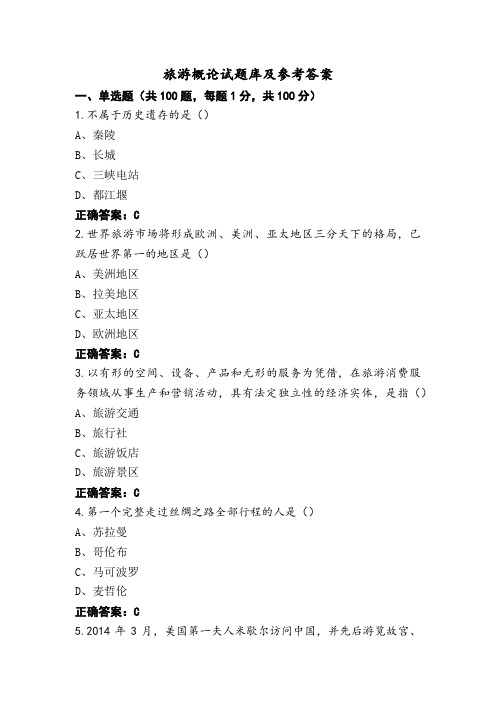
旅游概论试题库及参考答案一、单选题(共100题,每题1分,共100分)1.不属于历史遗存的是()A、秦陵B、长城C、三峡电站D、都江堰正确答案:C2.世界旅游市场将形成欧洲、美洲、亚太地区三分天下的格局,已跃居世界第一的地区是()A、美洲地区B、拉美地区C、亚太地区D、欧洲地区正确答案:C3.以有形的空间、设备、产品和无形的服务为凭借,在旅游消费服务领域从事生产和营销活动,具有法定独立性的经济实体,是指()A、旅游交通B、旅行社C、旅游饭店D、旅游景区正确答案:C4.第一个完整走过丝绸之路全部行程的人是()A、苏拉曼B、哥伦布C、马可波罗D、麦哲伦正确答案:C5.2014年3月,美国第一夫人米歇尔访问中国,并先后游览故宫、长城、西安古城、成都大熊猫基地等景点,这属于()A、专项旅游B、观光旅游C、跨国旅游D、新型旅游正确答案:A6.会议旅游是指()A、一种以购物为主要目的的旅游活动B、以朝圣、拜佛、求法、取经或宗教勘察为主要目的的旅游活动C、开会与旅游相结合的一种社会活动D、以会展业为依托的旅游活动正确答案:C7.国家旅游局的成立时间是()A、1984年8月B、1983年8月C、1985年8月D、1982年8月正确答案:D8.国务院再次发布决定,将清明节、端午节、中秋节定为法定1天的假日在()A、2007年12月B、2008年12月C、2006年12月D、2009年12月正确答案:A9.揭开中华民族旅游历史的活动的人物是()A、黄帝B、唐太宗C、秦始皇正确答案:A10.旅游的主体是()A、旅游业B、旅游交通C、旅游者D、旅游资源正确答案:C11.推进旅游产业转型升级的基础是优化旅游()A、市场结构B、产业结构C、行业结构D、产品结构正确答案:B12.国务院颁布《旅行社管理条例》的时间是()A、1997年B、1994年C、1995年D、1996年正确答案:D13.旅游业的生命线是()A、客源B、旅游资源C、服务D、旅游交通正确答案:A14.“旅游者在饭店最无法接受的就是较长时间的等候或者寻找。
《旅游学概论》综合试卷1含主观题参考答案
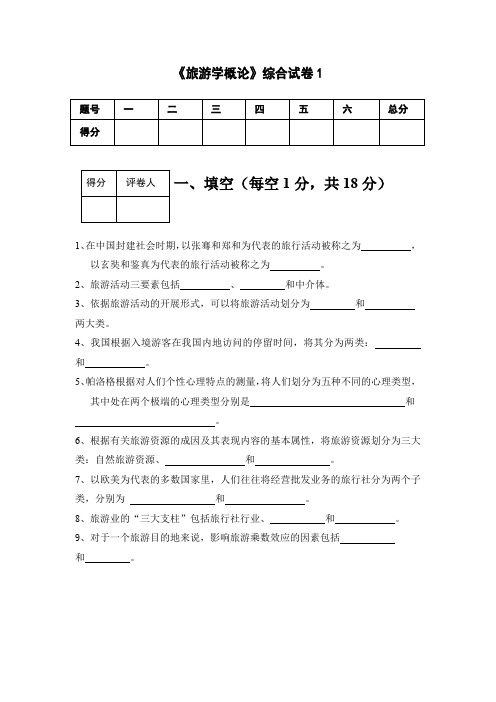
《旅游学概论》综合试卷11、在中国封建社会时期,以张骞和郑和为代表的旅行活动被称之为 ,以玄奘和鉴真为代表的旅行活动被称之为 。
2、旅游活动三要素包括 、 和中介体。
3、依据旅游活动的开展形式,可以将旅游活动划分为 和 两大类。
4、我国根据入境游客在我国内地访问的停留时间,将其分为两类: 和 。
5、帕洛格根据对人们个性心理特点的测量,将人们划分为五种不同的心理类型,其中处在两个极端的心理类型分别是 和 。
6、根据有关旅游资源的成因及其表现内容的基本属性,将旅游资源划分为三大类:自然旅游资源、 和 。
7、以欧美为代表的多数国家里,人们往往将经营批发业务的旅行社分为两个子类,分别为和 。
8、旅游业的“三大支柱”包括旅行社行业、 和 。
9、对于一个旅游目的地来说,影响旅游乘数效应的因素包括 和 。
一、填空(每空1分,共18分)二、单项选择题(每小题2分,共30分)1、关于19世纪以前旅游活动发展的特点说法不正确的是?()A、居主导地位的是帝王巡游B、总体规模和范围较小C、商务旅行是主体D、消遣性旅行活动规模较小2、以下属于消遣性旅游的是?()A、会展旅游B、探险旅游C、修学旅游D、探亲旅游3、下列哪一项不属于旅游资源评价的常见标准()。
A、美学标准B、文化标准C、政治标准D、市场标准4、对于消遣性旅游者,下列哪一项说法是错误的?()A、在整体旅游市场中所占的比例最大B、出游时间的季节性很强C、价格敏感度低D、对出行目的地选择较为自由5、我国首批被列入《世界遗产名录》的旅游资源不包括?()A、故宫博物院B、泰山C、黄山D、敦煌莫高窟6、关于旅游资源保护,下列说法正确的是?()A、对于自然因素导致的旅游资源破坏,人们无能为力B、旅游资源保护工作的原则是以“防”为主,以“治”为辅,防治结合C、旅游资源开发的意义要大于旅游资源保护的意义D、游客给旅游资源带来的破坏微乎其微7、下列哪一类旅游企业不属于间接旅游企业?()A、汽车旅馆B、餐馆C、电影院D、KTV8、下列哪项旅游目的地设施属于旅游上层设施?()A、供水系统B、游客问讯中心C、道路系统D、市内公园9、关于汽车旅行,下列说法错误的是?()A、自驾车游客数量不断增加B、环境污染较大C、不适合长途旅行D、自由、便利、安全10、关于我国入境旅游市场的基本状况,下列说法错误的是?()A、以港澳台游客为主,外国游客为辅B、以周边国家游客为主,欧美游客为辅C、以发展中国家游客为主,发达国家游客为辅D、外国游客的人均消费水平比港澳台游客高11、下列关于团体包价旅游说法错误的是?()A、省心省力B、安全感强C、省钱D、活动方式自由12、当今世界唯一全面涉及旅游事务的全球性政府间国际旅游组织是?()A、ATTAB、PATAC、NTAD、UNWTO13、关于我国国内旅游市场,下列说法正确的是?()A、消费总额增速快B、远程旅游比重大C、活动形式以团体旅游为主D、市场规模大,人均消费水平高14、下列属于可再生性旅游资源的是?()A、主题公园B、黄石国家公园C、清明上河图D、拙政园15、假设某旅游目的地用于购买当地产品和服务的支出、购买进口产品和服务的对外支出分别占旅游收入的40%、20%,则旅游收入带给该地经济的乘数效应是?()A、 1.20B、 1.25C、1.30D、1.35三、名词解释(每题5分,共25分)1、奖励旅游:是指包括企业、社会团体和政府机关在内的各种组织为了表彰和奖励那些工作成绩突出的员工和工作人员,而特别为其组织的免费旅游或度假活动。
旅游学概论期末考试试卷4套含答案
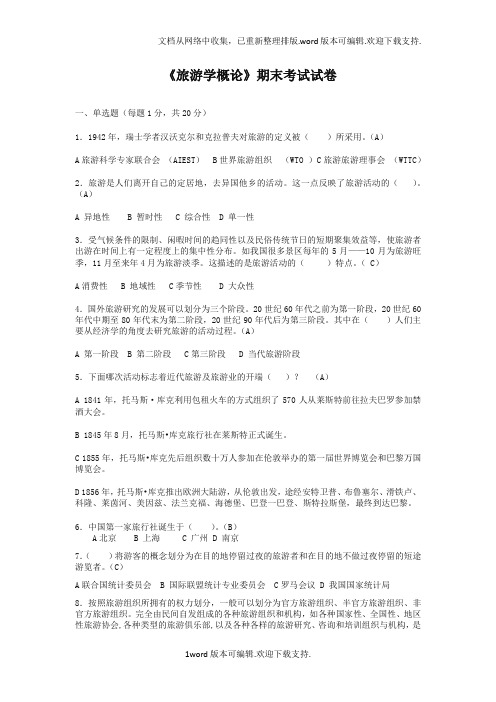
《旅游学概论》期末考试试卷一、单选题(每题1分,共20分)1.1942年,瑞士学者汉沃克尔和克拉普夫对旅游的定义被()所采用。
(A)A旅游科学专家联合会(AIEST) B世界旅游组织(WTO )C旅游旅游理事会(WTTC)2.旅游是人们离开自己的定居地,去异国他乡的活动。
这一点反映了旅游活动的()。
(A)A 异地性B 暂时性C 综合性D 单一性3.受气候条件的限制、闲暇时间的趋同性以及民俗传统节日的短期聚集效益等,使旅游者出游在时间上有一定程度上的集中性分布。
如我国很多景区每年的5月——10月为旅游旺季,11月至来年4月为旅游淡季。
这描述的是旅游活动的()特点。
( C)A消费性 B 地域性 C季节性 D 大众性4.国外旅游研究的发展可以划分为三个阶段。
20世纪60年代之前为第一阶段,20世纪60年代中期至80年代末为第二阶段,20世纪90年代后为第三阶段。
其中在()人们主要从经济学的角度去研究旅游的活动过程。
(A)A 第一阶段B 第二阶段 C第三阶段 D 当代旅游阶段5.下面哪次活动标志着近代旅游及旅游业的开端()?(A)A 1841年,托马斯·库克利用包租火车的方式组织了570人从莱斯特前往拉夫巴罗参加禁酒大会。
B 1845年8月,托马斯•库克旅行社在莱斯特正式诞生。
C 1855年,托马斯•库克先后组织数十万人参加在伦敦举办的第一届世界博览会和巴黎万国博览会。
D 1856年,托马斯•库克推出欧洲大陆游,从伦敦出发,途经安特卫普、布鲁塞尔、滑铁卢、科隆、莱茵河、美因兹、法兰克福、海德堡、巴登一巴登、斯特拉斯堡,最终到达巴黎。
6.中国第一家旅行社诞生于()。
(B)A北京 B 上海 C 广州 D 南京7.()将游客的概念划分为在目的地停留过夜的旅游者和在目的地不做过夜停留的短途游览者。
(C)A联合国统计委员会 B 国际联盟统计专业委员会 C罗马会议 D 我国国家统计局8.按照旅游组织所拥有的权力划分,一般可以划分为官方旅游组织、半官方旅游组织、非官方旅游组织。
自考旅游学概论试题及答案
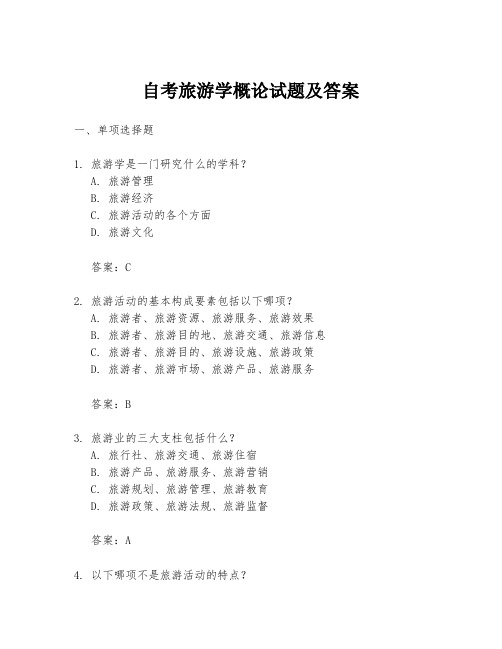
自考旅游学概论试题及答案一、单项选择题1. 旅游学是一门研究什么的学科?A. 旅游管理B. 旅游经济C. 旅游活动的各个方面D. 旅游文化答案:C2. 旅游活动的基本构成要素包括以下哪项?A. 旅游者、旅游资源、旅游服务、旅游效果B. 旅游者、旅游目的地、旅游交通、旅游信息C. 旅游者、旅游目的、旅游设施、旅游政策D. 旅游者、旅游市场、旅游产品、旅游服务答案:B3. 旅游业的三大支柱包括什么?A. 旅行社、旅游交通、旅游住宿B. 旅游产品、旅游服务、旅游营销C. 旅游规划、旅游管理、旅游教育D. 旅游政策、旅游法规、旅游监督答案:A4. 以下哪项不是旅游活动的特点?A. 娱乐性B. 异地性C. 盈利性D. 暂时性答案:C5. 旅游市场细分的依据通常不包括以下哪项?A. 地理位置B. 旅游目的C. 旅游收入D. 旅游偏好答案:C二、多项选择题6. 旅游规划的主要内容包括哪些方面?A. 旅游资源开发B. 旅游产品设计C. 旅游市场定位D. 旅游环境影响评估答案:A, B, C, D7. 旅游服务的特点包括哪些?A. 无形性B. 不可分割性C. 可存储性D. 质量易变性答案:A, B, D8. 旅游目的地的吸引力主要体现在哪些方面?A. 独特的自然风光B. 丰富的文化遗迹C. 高效的交通网络D. 完善的旅游设施答案:A, B, C, D9. 旅游法规的主要作用包括什么?A. 规范旅游市场秩序B. 保护旅游者权益C. 促进旅游业可持续发展D. 提高旅游服务水平答案:A, B, C10. 旅游信息的收集可以通过哪些途径?A. 旅游宣传册B. 互联网查询C. 口碑推荐D. 旅游博览会答案:A, B, C, D三、简答题11. 简述旅游活动对目的地经济的影响。
答案:旅游活动对目的地经济的影响主要体现在促进当地经济发展、增加就业机会、提高外汇收入、促进相关产业发展等方面。
同时,也可能带来物价上涨、环境压力增大等负面影响。
旅游概论期末试题及答案
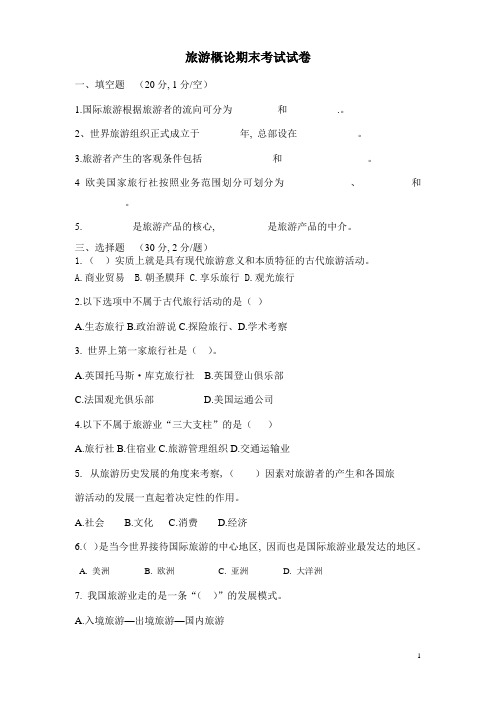
旅游概论期末考试试卷一、填空题(20分, 1分/空)1.国际旅游根据旅游者的流向可分为_________和__________.。
2、世界旅游组织正式成立于________年, 总部设在____________。
3.旅游者产生的客观条件包括______________和_________________。
4欧美国家旅行社按照业务范围划分可划分为_____________、__________和__________。
5.__________是旅游产品的核心, __________是旅游产品的中介。
三、选择题(30分, 2分/题)1.()实质上就是具有现代旅游意义和本质特征的古代旅游活动。
A.商业贸易B.朝圣膜拜C.享乐旅行D.观光旅行2.以下选项中不属于古代旅行活动的是()A.生态旅行B.政治游说C.探险旅行、D.学术考察3. 世界上第一家旅行社是()。
A.英国托马斯·库克旅行社B.英国登山俱乐部C.法国观光俱乐部D.美国运通公司4.以下不属于旅游业“三大支柱”的是()A.旅行社B.住宿业C.旅游管理组织D.交通运输业5. 从旅游历史发展的角度来考察,()因素对旅游者的产生和各国旅游活动的发展一直起着决定性的作用。
A.社会B.文化C.消费D.经济6.()是当今世界接待国际旅游的中心地区, 因而也是国际旅游业最发达的地区。
A. 美洲B. 欧洲C. 亚洲D. 大洋洲7. 我国旅游业走的是一条“()”的发展模式。
A.入境旅游—出境旅游—国内旅游B.入境旅游—国内旅游—出境旅游C.国内旅游—入境旅游—出境旅游D.国内旅游—出境旅游—入境旅游8.()旅游者是目前我国国内旅游市场的主体。
A.公.B.休.C.观.D.度.9、在饭店等级标识方法上, 我国较为流行的划分和标定方式是以()表示。
A. 数字B. 英文字母C. 皇冠D. 星号10、就我国而言, 港澳台地区居民前往我国大陆地区访问被视为()。
A. 入境旅游B. 出境旅游C. 国内旅游D. 国际旅游11、1927年中国出现最早的旅游组织——中国旅行社, 其创始人是()。
旅游学概论试题及答案
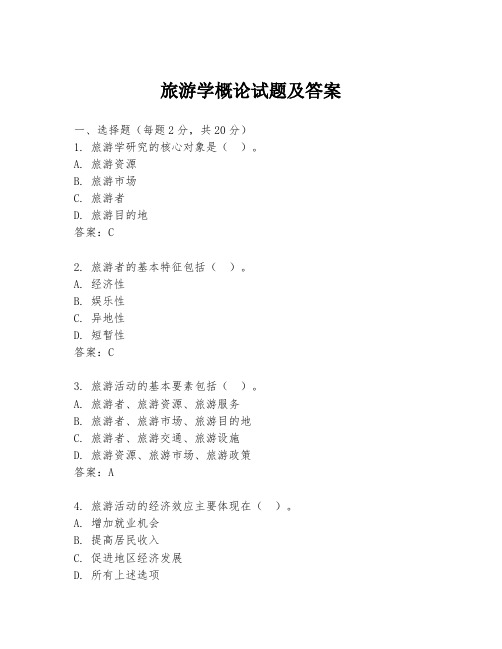
旅游学概论试题及答案一、选择题(每题2分,共20分)1. 旅游学研究的核心对象是()。
A. 旅游资源B. 旅游市场C. 旅游者D. 旅游目的地答案:C2. 旅游者的基本特征包括()。
A. 经济性B. 娱乐性C. 异地性D. 短暂性答案:C3. 旅游活动的基本要素包括()。
A. 旅游者、旅游资源、旅游服务B. 旅游者、旅游市场、旅游目的地C. 旅游者、旅游交通、旅游设施D. 旅游资源、旅游市场、旅游政策答案:A4. 旅游活动的经济效应主要体现在()。
A. 增加就业机会B. 提高居民收入C. 促进地区经济发展D. 所有上述选项答案:D5. 旅游规划的主要目的是()。
A. 保护环境B. 促进旅游发展C. 提高旅游服务质量D. 增加旅游收入答案:B6. 旅游市场营销的核心是()。
A. 产品B. 价格C. 促销D. 渠道答案:A7. 旅游产品的特点包括()。
A. 无形性B. 不可分割性C. 不可储存性D. 所有上述选项答案:D8. 旅游服务的提供者是()。
A. 旅游者B. 旅游企业C. 旅游目的地D. 政府答案:B9. 旅游目的地的吸引力主要取决于()。
A. 旅游资源B. 旅游政策C. 旅游服务D. 旅游者需求答案:A10. 旅游可持续发展的核心是()。
A. 环境保护B. 经济发展C. 社会进步D. 所有上述选项答案:D二、填空题(每题2分,共10分)1. 旅游学是一门研究旅游活动及其影响的______学科。
答案:综合性2. 旅游者进行旅游活动的主要目的是______。
答案:休闲、娱乐3. 旅游活动的经济效应包括直接效应和______效应。
答案:间接4. 旅游规划的基本原则包括科学性、______和可持续性。
答案:合理性5. 旅游市场营销的4P策略包括产品、价格、______和渠道。
答案:促销三、简答题(每题10分,共20分)1. 简述旅游活动的社会文化效应。
答案:旅游活动的社会文化效应主要表现在促进文化交流、增进民族理解和友谊、提高居民素质、促进地区文化发展等方面。
旅游学概论试卷、习题及答案
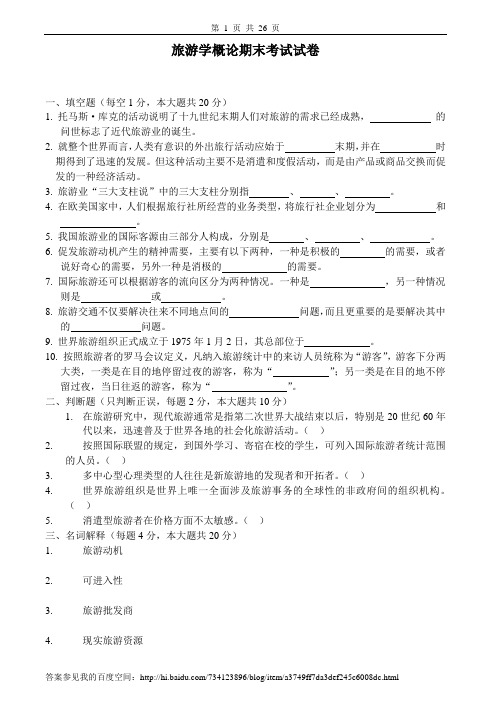
旅游学概论期末考试试卷一、填空题(每空1分,本大题共20分)1. 托马斯·库克的活动说明了十九世纪末期人们对旅游的需求已经成熟,的问世标志了近代旅游业的诞生。
2. 就整个世界而言,人类有意识的外出旅行活动应始于末期,并在时期得到了迅速的发展。
但这种活动主要不是消遣和度假活动,而是由产品或商品交换而促发的一种经济活动。
3. 旅游业“三大支柱说”中的三大支柱分别指、、。
4. 在欧美国家中,人们根据旅行社所经营的业务类型,将旅行社企业划分为和。
5. 我国旅游业的国际客源由三部分人构成,分别是、、。
6. 促发旅游动机产生的精神需要,主要有以下两种,一种是积极的的需要,或者说好奇心的需要,另外一种是消极的的需要。
7. 国际旅游还可以根据游客的流向区分为两种情况。
一种是,另一种情况则是或。
8. 旅游交通不仅要解决往来不同地点间的问题,而且更重要的是要解决其中的问题。
9. 世界旅游组织正式成立于1975年1月2日,其总部位于。
10. 按照旅游者的罗马会议定义,凡纳入旅游统计中的来访人员统称为“游客”,游客下分两大类,一类是在目的地停留过夜的游客,称为“”;另一类是在目的地不停留过夜,当日往返的游客,称为“”。
二、判断题(只判断正误,每题2分,本大题共10分)1.在旅游研究中,现代旅游通常是指第二次世界大战结束以后,特别是20世纪60年代以来,迅速普及于世界各地的社会化旅游活动。
()2.按照国际联盟的规定,到国外学习、寄宿在校的学生,可列入国际旅游者统计范围的人员。
()3.多中心型心理类型的人往往是新旅游地的发现者和开拓者。
()4.世界旅游组织是世界上唯一全面涉及旅游事务的全球性的非政府间的组织机构。
()5.消遣型旅游者在价格方面不太敏感。
()三、名词解释(每题4分,本大题共20分)1.旅游动机2.可进入性3.旅游批发商4.现实旅游资源5.国际旅游组织四、简答题(每小题6分,本大题共30分)1.简述托马斯·库克的主要活动及其贡献。
- 1、下载文档前请自行甄别文档内容的完整性,平台不提供额外的编辑、内容补充、找答案等附加服务。
- 2、"仅部分预览"的文档,不可在线预览部分如存在完整性等问题,可反馈申请退款(可完整预览的文档不适用该条件!)。
- 3、如文档侵犯您的权益,请联系客服反馈,我们会尽快为您处理(人工客服工作时间:9:00-18:30)。
盐城师范学院考试试卷2013-2014学年第一学期商学院旅游管理专业《旅游学概论》试卷A班级学号姓名一、中英文互译(每题1分,共20题,共20分)1. outbound tourist2. international tourist3. inclusive tour4. cultural identity5. market segment6. sustainable development7. non-renewable tourism resource8. incentive travel9. inbound tourist10. leisure time11. 出境旅游者12. 商务旅游13. 空间移动14. 独家分销15. 大众旅游16. 历史吸引物17. 辅助设施18. 公务旅游19. 国内旅游者20. 入境旅游者二、填空题(每题1分,共15题,共15分)pull; on behalf of; indicator; artificial; spatial; residence; deposit ; backstage; tourists ; authenticity; product; techniques; check in; permanent environmental;1.In fact, at any stage of the destination life cycle, will be held back by this or that factor.2. According to the star classification, hotels can be classified into five categories and stars are used as a sign to them.3. The front office has the to provide satisfactory service for the guests so that they will choose to stay at the hotel again and again.4. A tourist will consume the tourism _ ____the tour operator offers when they aretraveling.5. The ____ movement from his residence to the destination plays an important role in realizing his travel desire.6. Tourism happens only when people travel from their to the destinations and enjoy the beautiful landscapes or the historical interests there.7. Tourist-resident tensions may occur when they have a different understanding of the -------- about the performance at the destination.8. The tourist destination functions as a _ factor in the market and provides an area for most of the tourism activity.9. Of course genuine experience is not the choice of all some of them take part in tourism activities just for entertainment and excitement.10. We may see some cultural landscape in the _ space which has some features in common with that found in other communities of a similar size and location.11. Nowadays, the modern society is characterized by rapid changes, and so are hotels. We should, therefore, change or upgrade the of management of modern hotels so as to adapt to the changing society.12. The second stage is called _or arrival stage which involves such steps as arriving at the hotel, filling in registration information and having their rooms assigned.13. The third stage is the occupancy stage at which the front office will the hotel, keep in contact with the guests and help them handle any problem they may meet during their stay.14. In case some guests, particularly the chance guest, should leave the hotel without paying, the can partly cover the loss.15. At the consolidation stage, the growth rate of visitors is slowing down while the number of them is still increasing and sometimes even exceeds residents三、判断题(每题1分,共10题,共10分)Decide whether the statements are true or false. If it is true, put “T” in the space provided and “F” if it is false.1.___ _____ Mass tourism refers to the large-scale packaging of standardized leisureservices that is sold to customers at changeable prices.2.___ ____ Travel before the Industrial Revolution was mainly for pilgrimages, for business or for official purposes.3. ____ ___ In the late 20th century, there has been a globalization of the tourism industry.4. _ ________ The discretionary income refers to the gross income an individual earns.5. ___ _______ To measure an individual’s travel propensity, chronological age is more accurate than domestic age.6. __________ Companies such as Disney and McDonald’s make use of the lifec ycle concept to attract young children.7. ___ ______ Tourism is facing significant and radical changes in business methods inresponse to the enormous changes taking place in the elements of the product and conditions of the market.8. ________ Once the organizations choose a distribution channel, they can hardly change it.9. _________ Intensive distribution is often adopted by those organizations while product is highly specialized and confronts little competition.10. ________ It is urgent to find proper ways to utilize and protect tourism resources.四、名词解释(每题3分,共5题,共15分)1.Tourism industry:2.Discretionary income:3.Tourism demand:4.Destination life cycle:5.Destination image:五、简答题(每题5分,共5题,共25分)1. What are the principles that should be used as the guidance of any plan for proper utilization and conservation of tourism resources?2. How many stages are there in a guest cycle? And what are they?3. Why do people frequently use car as the transportation means for recreation and tourism?4. What are the main determinants of demand for travel?5.What are the most important factors that stimulate the mass tourism?六、论述题(第一题7分,第二题8分,共15分)1. 论述影响民族文化真实性的因素2. 旅游目的地形象的形成过程.诚信考试承诺我承诺:追求真知,展示真我,诚实守信,杜绝作弊。
